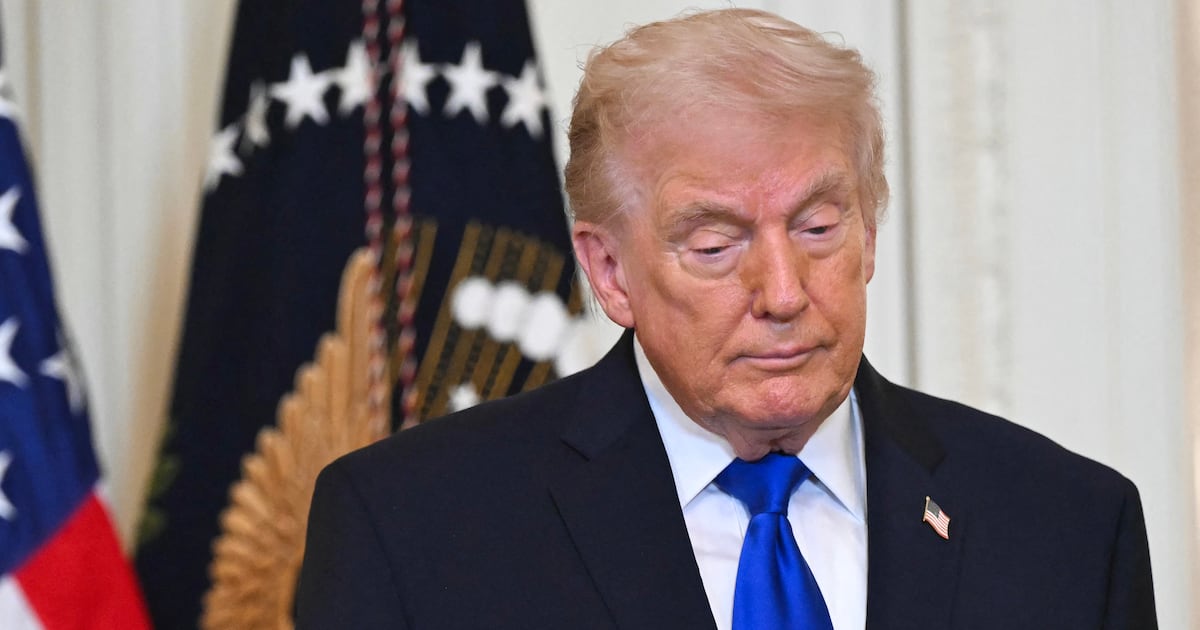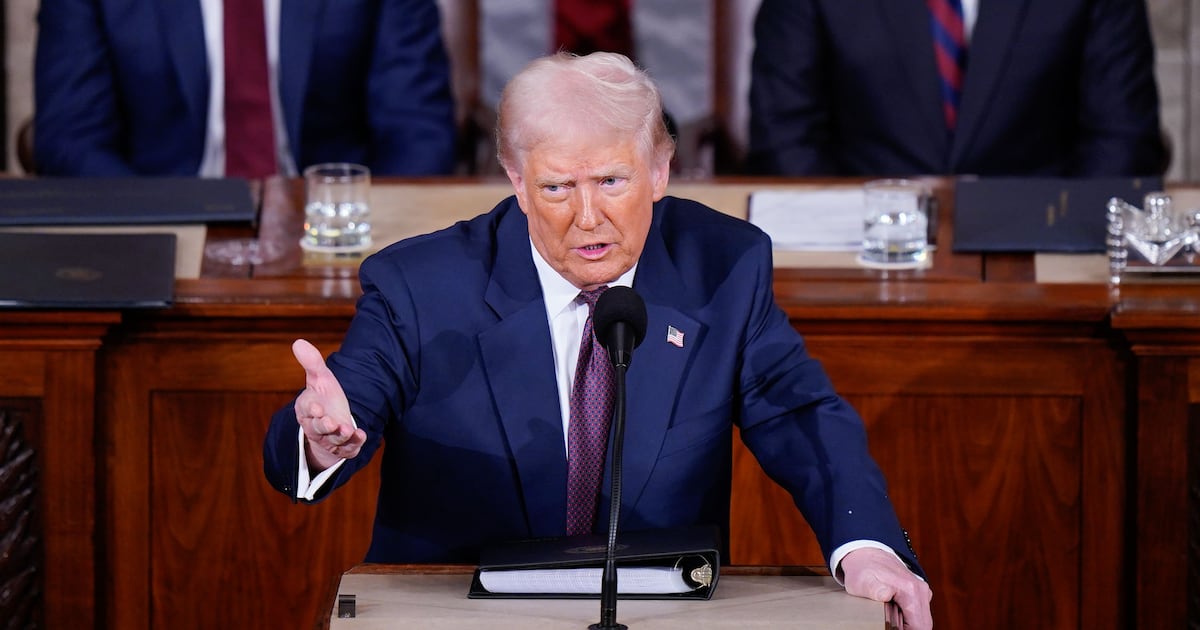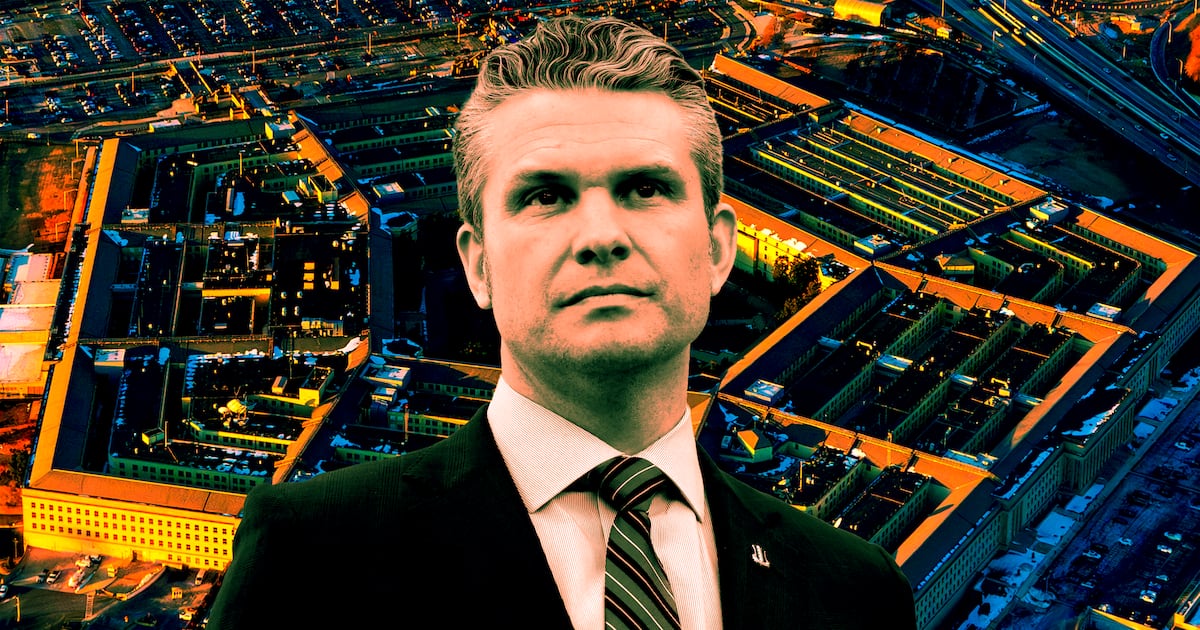LAS VEGAS, Nevada—Jeff Kugele emerged from his garage on Saturday afternoon shirtless and wearing Miller Lite boxers, caught off-guard by the two canvassers who’d knocked on his door.
The canvassers wore the red shirt and hats of the powerful Culinary Union Local 226 and they’d ventured to Kugele’s doorstep eager to know if he was going to vote. In fact, he explained, he had already done so, casting his ballot for a straight Democratic ticket on the first day of early voting in Nevada.
“Jesus Christ, get rid of this fucking nightmare,” said Kugele, a 55-year-old former military officer who claimed to be “going on 25.”
A loud television set blared in the background as Kugele described the current president as “Ku Klux Trump, the Russian spy.” He said his parents were immigrants from Germany and that his father and grandmother were prisoners of war at the hands of Russia.
Part of his motivation to cast a ballot for Rep. Jacky Rosen (D-NV), the first-term congresswoman taking on incumbent Sen. Dean Heller (R-NV), was the latter’s newfound fondness for President Trump.
“He’s a turncoat,” Kugele said of Heller. “Benedict Heller, that’s his real name. Spineless and Benedict. He’s out for himself.”
While the Culinary Union didn’t confront any other voter dressed solely in their skivvies that day, its members did find a number who shared Kugele’s political dispositions, and many more who promised they’d vote. Miles from the bright lights of the Vegas Strip, many residents said they were disappointed with the government and viewed Nov. 6 as a chance to register that disappointment.
“Long before Rosen got into the race, I referred to Senator Heller as an empty suit,” William Carrico, a 67-year-old Vegas resident who recently retired from the federal public defender’s office, told The Daily Beast at a Saturday morning rally. “You just had to fill him up and tell him what to say.” He said that members of his immediate family have pre-existing conditions and that in 2016, he did not vote for “the Cheeto.”
“The Republicans haven’t put anything on the table that even looks like health care,” Carrico said.

If Democrats are going to pull off victories in the close Senatorial and gubernatorial elections in Nevada this year, it will be on the backs of voters like Kugele and with the help of organizations like the Culinary Union. The union is a powerhouse in Nevada politics and, as it does every cycle, it’s embarked on an ambitious Get Out The Vote operation in the closing weeks of this election. Currently, it has 250 members in the field, working 10-12 hour days six days a week, which they say will increase to 300 in the final days before the election—figures that match what it has done in presidential years, according to Bethany Khan, communications director for the union.
So far, it appears, the formula is once again working. Turnout in Clark County, the most populous in the state which includes Las Vegas, was near 2016 levels, according to analysis of the returns by Jon Ralston, the founder of The Nevada Independent. Some 30,000 voters cast ballots, which was three times the amount on the first day of early voting in the county in 2014, a wipe-out year for Democrats across the nation. There were also encouraging signs in Washoe County, home to Reno, which Clinton narrowly carried in 2016 as well. That trend appeared to continue on Sunday.
On Saturday afternoon, the two-man team of Alfonso Maciel, a 23-year-old cook at the Excalibur Hotel and Casino and Gidget Aranda, 47, who works at the Aria Resort and Casino, were working to pad those numbers in the days ahead. The two walked blocks in the residential parts of Las Vegas and even drove some people to a nearby Albertsons grocery store to cast early ballots.
“It’s a big responsibility but I feel like if it were on anybody’s shoulders, I’m glad it’s ours,” Maciel told The Daily Beast.
As part of their task this day, Maciel and Aranda distributed a voting guide and a poster in English and Spanish with a reminder of when early voting begins. The literature had a specific focus on ensuring that Latino residents were keenly aware that their vote matters on issues like health care and education. In a conversation with one man, who had rushed outside to make sure his back gate was closed as three dogs howled, the two canvassers managed to coax out a commitment that he’d bring his daughters to the polls on Sunday—even as two chihuahuas got out of the gate and yipped throughout the conversation.

“A lot of them don’t like politics. They don’t even watch the news,” Aranda remarked on Latino voters in the state. “A lot of them don’t vote because their parents cannot vote so they don’t see them going to the polls. It has to come from your family. A lot of people think that voting for president is the only time that you need to vote. I tell them ‘you need to vote on both.’”
Latino voter apathy has been one of the main concerns for Democrats, both in Nevada and in several other critical states this cycle. A recent NBC News/Wall Street Journal survey found that Latino voters favored a Democratic Congress by 66 percent to 26 percent, but in Nevada, those margins have been narrower and there is fear that turnout itself may be low, as it often is in midterm election years.
Heller, who has held various offices in the state since 1995, is also a well-known entity among voters and Rosen is not. In 2016, a Latino Decisions poll on election eve found that Hillary Clinton earned the support of 81 percent in Nevada, a factor that drove her narrow statewide win as well as the election of Sen. Catherine Cortez Masto (D-NV), the nation’s first Latina senator. Rosen, a first-term Congresswoman for Nevada’s 3rd Congressional District, has comparatively lower name ID, having previously been the president of a reform Jewish Synagogue before entering politics.
That disparity in name recognition, combined with a heavy rural-urban divide that makes Nevada a purple state, has posed challenges for Democrats this cycle, even as the national political climate has given the party tremendous electoral opportunities. What has kept operatives in the state relatively calm is the endurance of the electoral machine—built by former Majority Leader Harry Reid (D-NV) and his former chief political strategist Rebecca Lambe—that has produced Democratic victories time and again.
Current members of the Nevada Democratic party pointed to the fact that they organize year round and that they have been tirelessly registering voters in a state that, particularly in Las Vegas, is quite transient, boosting their active voter registration advantage over Republicans by 15,000 since March.
“Senator Reid has obviously done a lot for the state party here,” Helen Kalla, communications director for the party told The Daily Beast. “You know, he really built it into the incredible machine that is today.”
The Culinary Union is a key cog in that machine, though they operate on their own based on who the union endorses. Its first major impact on a statewide race was in 2010 when Reid won despite polls showing him trailing Republican nominee Sharron Angle by as much as double digits.
“It was kind of a ‘holy shit’ moment,”a former Reid aide told The Daily Beast, who said the union was a major part of it. “The culinary union is an around-the-clock organization. They’re not just organizing for campaigns, they’re organizing for their workers. They’re at the gym every day. They’re not just showing up two weeks before the marathon.”
Rosen is leaning on unions to come through again. On a Saturday morning event at union headquarters, she, Cortez Masto, Democratic gubernatorial candidate Steve Sisolak and former Vice President Joe Biden rallied the troops on the first day of early voting.
“I was a member about 40 years ago and it helped me pay my college tuition and I am always grateful for that union card I held back then,” Rosen told the crowd. “I waited tables right there at Caesars Palace.”
Now gunning for the Senate, Rosen has built her campaign on championing health care, with a constant focus on Heller’s past votes to repeal the Affordable Care Act. In the end, however, her success may just hinge on the help of the union where she once was a member, though antipathy towards the current occupant of the White House doesn’t hurt either.
“The Trump administration has done a really good job of sending a message to younger voters that it’s not important to vote,” Maciel said before getting in his car to door-knock on another block. “We’re trying to get people to realize that they have to start thinking about the future. The consequences of every election is going to benefit or endanger the future that they’re creating.”







